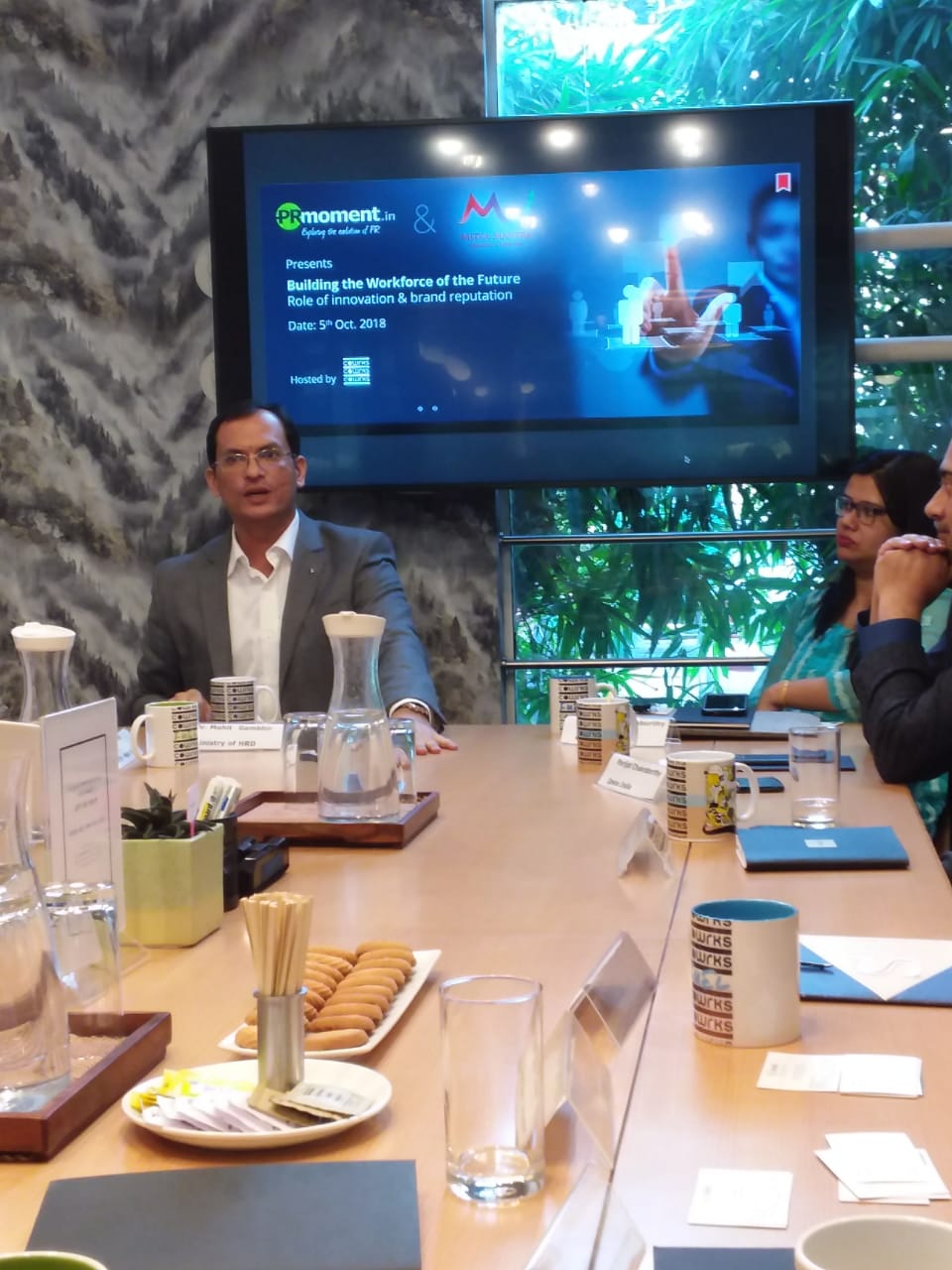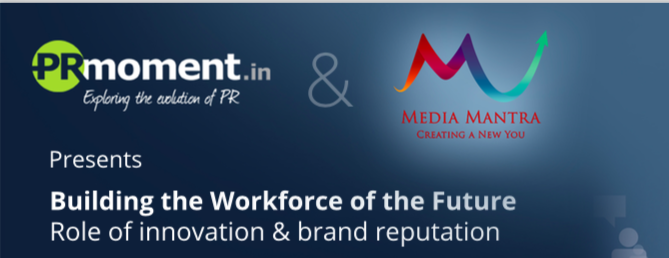The PRmoment India-Media Mantra #PR4HR roundtable discusses fresh approaches to employee engagement
PR Insight
Paarul Chand
The intersection of HR and PR has been long established. HR and internal communications work hand in hand to communicate crucial aspects of a firm's culture, policy, rules and mission to the employees. At the same time, executive search firms play a crucial role in the hiring of key people in a company, this role can often go unrecognised in the public domain.
Udit Pathak, co-founder and director, Media Mantra, says, "In my experience, executive search firms can significantly impact the future direction of a company as they often help to hire key leadership talent for firms. But the strategic work they do is sometimes not recognised. Effective communication strategies for the executive search firms can support their outreach with clients and create awareness about the work they do."
In order to create a conversation between in-house HR professionals, internal communications specialists and executive search firms on what can be the way ahead for supporting the development of the most important asset in the age of social media: 'Human Capital.', Media Mantra, the 6th fastest growing PR in APAC supported ongoing initiatives by PRmoment India to create meaningful conversations around issues that intersect with PR.
How are today's HR and internal communication innovating to keep people in the workplace engaged, how are they tackling the diversity question, how to build rewards so that people feel invested in working over a period of time and the rising crucial role of communication in all of this. To discuss all this and look at how PR intersects with HR, the PRmoment India- Media Mantra PR4HR roundtable focused on " Buiding the Workforce of the Future", the role of communication.
To provide context for this, Mercer, the global firm that plans and executes employee benefits' calls the current phase of work structures, 'The Human Age'. Mercer, in its latest report, called, " Unlocking Growth in the Human Age", says today's employers are redesigning work to harness technology. But, Mercer believes, today's businesses can't succeed without prioritising people. It's human capital, rather than technology that leads to innovation and growth in the 21st-century workplace.
Communicating with them effectively will be a key strategic edge in the future.
Here are some of the key takeaways from the discussion
Young professionals entering the workforce are educated but unemployable 
In order to make young people job-ready, Dr Mohit Gambhir, innovation director, at the newly set up innovation cell of the Ministry of Human Resource Development, Government of India said that we need to take on the challenge of teaching our kids to think and research, not just cram and learn information. In fact, to support innovation in higher education, the innovation cell has also launched last month, the 'Atal Ranking of Institutions on Innovation Achievements.' This ranking has been designed to assess universities and higher education institutions on innovation parameters. This, it is hoped, will help introduce an innovation mindset in talent right from the entry level.
Dr Gambhir also invited corporate India to take part in the 'Smart India Hackathon 2019' a nationwide initiative to provide students with a platform to solve some of the pressing problems we face in our daily lives, and thus inculcate a culture of product innovation. In the 2019 edition, students would have the opportunity to work on challenges faced within the public and private sector organizations, and NGOs in addition to government problems pooled from various union ministries.
Tackling the individual brilliance challenge
Roundtable attendees pointed out that the current emphasis on individual brilliance is putting pressure on professionals to excel and yet are isolated from the rest of the colleagues. Arpan Basu, general manager & head communications at Coca-Cola India & South West Asia, said that " Today we, collectively in the corporate world, are probably structured to recognize and promote individual brilliance. The idea, however, is to work towards a common goal jointly as an organization and hence the importance of being able to work together as a team. An ideal approach would perhaps be to evaluate team brilliance while not ignoring individual efforts. "
Agreeing with this statement, Vandana Chopra, head for brand and communications at KPMG India, said that the old cliche of you only being as good as your team is very true. Chopra added, "Why would you have a team that isn't great to work with. Team members help to fill each other's skill gaps."
Engaging with employees, the talent retention challenge
One of the biggest issues facing HR and subsequently internal communications is how to keep employees engaged and to ensure an effective reward system for them. Aishwarya Ramesh, South Asia region lead, at the Global HR Transformation project at Nestlé, stated that we must take a good hard candid look at the HR industry and see how we can best provide an incremental reward system for employees. Ramesh pointed out that another challenge is keeping people at work connected with the organisation and therefore improve the retention of talent.
Aishwarya also commented that "Company culture which has such a crucial role in ensuring that employees are future ready is not just HR's business."
Pooja Pathak, co-founder, Media Mantra said that often everyday compassionate communication is forgotten while attempting to engage employees. A believer in the power of appreciation for work done, Pathak said 60% of their employees are still with them seven years after launching Media Mantra.
Failing to succeed, no more ratings
Participants also pointed out that HR and internal communications campaigns that focus on the importance of 'Failing to Succeed' can be especially powerful in redefining what is a successful performance at work.
Aishwarya said that their internal video campaign that had senior executives leadership talking about their own failures and challenges were very impactful. Shonali Chakravarty, head of policy and safety communications for Uber India & South Asia said that " Display of vulnerability. Sharing stories of failures can also be very helpful to inspire colleagues especially for millennials in a firm. "
Ranabir Majumdar, head of internal communications - India and South Asia at Uber, further shared how Uber has done away with employee rating systems. Instead, Uber employees have the freedom to set their own work goals including citizenship goals that are about a larger community goal.
When culture emanates from leadership
Basu said that “At the end of the day culture is not one man’s responsibility but the desired outcome that the everyone in the organization must work towards. Leadership at the same time can play a part by being an example of the change they want to see.”
Commenting further on top-down culture, Parijat Chakraborty, executive director and head of public affairs business at leading market research firm Ipsos India, said that ' Top-down approval systems can limit organisations. However, solutions such as group discussion and town halls are great levellers in communicating openly through an organisation."
Commenting on the role of innovation in HR, Udit Pathak, co-founder, Media Mantra asked whether innovation in engaging employees is faster in growing firms or established firms. Chopra responded saying quick innovation can happen in large firms as well. Chopra shared that at KMPG India, which has 20,000 employees in the country, she has a colleague with a degree in anthropology. Firms such as KPMG are hiring people from diverse background to encourage innovation and growth.
The 'Diversity hiring' question
While few communicators will disagree that greater diversity is needed, it is happening at a slow pace in India. Pankaj Raj, Co-founder & director at Search Value, a firm that does senior hires and consults on diversity at the workplace says that the bulk of people doing the hiring at organisations want "People like them". This doesn't help with getting diverse thinking at the top.
Ajay Sood, senior partner with the search firm, Accord India said that " Unless we go beyond lip service we will not be able to diversify talent. "
Thank you Media Mantra for supporting and enabling the #PR4HR roundtable and CoWrks for hosting the discussion.

If you enjoyed this article, you can subscribe for free to our weekly event and subscriber alerts.
Featured

PR professionals share their views on journalists publicly calling them out on story pitches

Auto blogger renders unconditional apology to Value 360 for defamatory posts

Hottest Indian startups of 2020, Paytm, Dreams 11 lead the charge: Wizikey Report




